Rescue mission to Croatia, 2000
Every Christmas Marlena and Jim Geren of Sewickley took medical supplies and toys to hospitalized kids in war-torn Croatia. Martha Rial and I went along. It's the kind of story no paper will do again.
This ‘refer’ box on Page 1 pointed to the main story inside in the Magazine section. If you subscribe to newspapers.com you can find this story here.
***
We did a sidebar on a crowded orphanage.
Drug Rehab
A month later I wrote this article about our visit to a women’s drug rehab center in an old seminary in the mountains 25 miles inland from Split and the Adriatic.
If you can’t read the copies of the paper above, read this:
Going the Distance
Zagreb, Croatia -
You'd think Jim Geren would be miserable, or at least a little cranky.
He's 4,550 air miles from his home in Sewickley. He has had two, maybe three
hours of sleep since he left Pittsburgh 40 hours before. He hasn't had
breakfast or lunch. But the US Airways pilot is having so much fun, he's
starting to sweat.
Geren is in a hallway in the cancer wing of Children's Hospital of Zagreb. It’s crowded with 10 people and about a dozen fat cardboard boxes covered in Santa Claus paper. He's digging through about 300 Millennium Barbies, Mustang Mach III racing cars, chess sets, Star Wars games and stuffed animals, pulling them
out of boxes and piling them up inside steel baby cribs. Girls toys here. Boy's toys over there.
Geren, who paid for the toys and had the boxes shipped from
Pittsburgh to Zagreb a month earlier, is the man in charge. But he has plenty of help. Head nurse Milko Valpotic is helping him choose the right toys. Nurses are ready to push the two hospital carts loaded with presents into a room where
five boys and girls with shaved heads and IV bottles dripping into their
arms are smiling with anticipation.
Geren's wife and co-Santa Claus, Marlena, is buzzing around, being her
irrepressible, upbeat, smiling, God-thanking, always helpful self. She's sorting through the unwrapped toys and speaking in her native Croatian to the local journalists covering the heartwarming event.
Marlena is telling the journalists about the history of Children's Rescue Relief, the
non-profit international relief organization Jim Geren founded and devotes most of his time to when he's not captaining MD-80 airliners up and down the East Coast of America. She's telling them how her husband has spent hundreds of thousands of his own dollars since 1994 to help the people of Croatia, one of the most Westernized of the breakaway pieces of the former Yugolsavia.
She is also telling them how Jim has taken more than 50 airplane rides from
Pittsburgh to Frankfurt to Zagreb and back since 1994. And that he's made
most of those body-punishing, three-day roundtrips to hand-deliver medicine,
chemotherapy drugs, surgical sutures and hospital sheets to Children's
Hospital, as well as other supplies to two state orphanages in Split, the historic tourist town on the Adriatic Sea.
There's one important detail Marlena, 34, is leaving out. She's not telling the journalists about the crucial role she plays in the success of CRR. A flight
attendant with US Airways who flies about 90 hours a month on the Pittsburgh-Frankfurt run, she modestly credits everyone from the bosses of her company to God Almighty for the good her husband’s start-up relief agency has been able to do. But anyone observing her and Jim in action for more than 20 minutes can see the obvious: she is CRR's secret weapon.
As Marlena is being interviewed and photographed, she is also always doing her No.1 job - keeping a close eye on Jim in case he needs something. "No, no,
not balls, Jim," she warns him gently as he places a Sunoco soccer ball on a
cart. "Some of them don't have a leg."
Before the afternoon is out, Jim and Marlena and their little train of toys
will visit every wing in the crowded 250-bed hospital. "Shlepping Toys R Us
again," jokes Marlena. She is so pleased when she realizes they have more
than enough toys for every child, she emits one of the many cheery little
prayers she unselfconsciously delivers throughout the day. "Thank you God,
thank you so much Father. Amen."
Children's Hospital of Zagreb, the country’s only children’s hospital, is a public hospital that operates on a shoestring budget of about $12 million a year (96 million kuna) and has a staff of 800. It looks just like an American hospital, except that it is tucked unobtrusively into the middle of a solid block of apartment buildings on one of downtown Zagreb's beautiful old streets.
The hospital is stocked with modern beeping and blinking medical equipment, but it is always scrambling for more funding. In a country still struggling to recover from the ill-effects of a recent civil war and 45 years of communism, the hospital is chronically in need of the low-priority but important items that Jim and CRR can provide -- bed sheets and surgical gowns. Jim also has occasionally had to meet the hospital’s most basic needs -- paper napkins and toilet tissue.
Children’s, like any hospital anywhere, is filled with tragedies and
miracles. In the burn ward, two brothers wrapped up like mummies lie next to
each other. The 13 year old, Ivan, has a tube in his mouth and is covered by
an air-filled blanket that protects his newly grafted skin from infection.
He clings to life 50 days after the propane explosion that blew up their
home and killed their mother.
In a small room in the cancer ward, four toddlers lie in their cribs, each
with a parent at their side. Marlena visits each child, smiling, talking,
cooing in her native Croatian one minute and talking to Jim in English the
next. After studying a 10-month-old boy who needs a bone-marrow transplant to have any chance of surviving, Marlena turns away, looks heavenward and says, "May God heal them all."
xxxxxxxxx
Jim, 56, played Santa Claus in Croatia last year too, and he loves doing it.
This is his heart's best reward - seeing smiles on the faces of sick kids. It's the
only paycheck he gives himself for another year of helping children in Croatia.
The first time Jim dispensed toys, when he gave out more than 1,000 presents in 1998, he was very uncomfortable. He was afraid he was imposing himself on the kids in the hospital and orphanages. He didn’t feel right taking pictures of sick and dying children, even though he knew he was bringing them some joy.
Since then, however, several Croatian doctors have set him straight. They
told him not to worry. The presents were the best medicine he could give the
children. "That gets you going more and more," says Jim, who is as quiet and
laid-back as Marlena is bubbly and animated. "Then my wife comes by and she
brightens them up. It makes you feel good and it keeps you charging."
Charging around is something that comes naturally to Jim and Marlena, who
both seem to spend most of their non-working hours thinking of ways to help
people. Jim, who averages about $170,000 a year as an airline captain, estimates that in the last six years he has spent $300,000 of his income on Children's
Rescue Relief. He spent $50,000 in 1999.
With that money, and Marlena's knack for finding people and places that need
their help, the Gerens have put together a nimble mom&pop international
relief agency. Its specialty is doing what big relief agencies can not do -
quickly delivering small shipments of things like medical supplies and
being able to guarantee that they go directly to the people who need them.
As Jim says, CRR is not in competition with Brothers Brother
or Global Links, Pittsburgh-based relief organizations that ship supplies by the boat load. "We don't care about tonnage. We want to do what they can't -- hand-deliver medicine and be an instrument to save a child's life in 24 hours."
It's only possible for CRR to do this because Jim and Marlena do most of the
grunt work themselves and take full advantage of the free-or low-cost travel
perks that come with their airline jobs.
Jim not serves as an unpaid super-courier, he does all the administrative work and searches for relief supplies. He has found steady sources of free surplus supplies by writing letters to the heads of companies like Standard Textile of xxx and Schein Pharmaceutical, a maker of generic drugs in New Jersey.
His networking has been paying off. Out of the blue, CRR recently was given 11,000 surplus hospital uniforms – an 18-wheeler’s worth. They came from one of Standard Textile’s customers in Indiana after Textile’s owner told them about CRR. Jim will take as many uniforms he can to Children’s Hospital of Zagreb and another Croatian hospital and give the rest to Global Links, which will send them to South America.
When Jim makes his speedy deliveries, he spends about 11 hours in the air each way. He flies for free to and from Frankfurt on US Airways and the Frankfurt-Zagreb roundtrip costs about $120. He could sit in the cockpit on the way to Germany if he wanted, but he usually spends $150 to upgrade his coach seat to Envoy class, where he has a better chance of catching some sleep. A few times he’s crossed the Atlantic perched on a jump seat, one of the fold-down seats in the back of the plane that flight attendants use.
Jim usually takes just two 70-pound boxes per trip, which is what any passenger is entitled to check on a flight. But his bosses at US Airways have made sure that on special occasions, as long as extra cargo space is available, CRR can have what it needs on Pittsburgh-Frankfurt flights. When Jim set his single-plane “record” of 28 boxes of Christmas presents in 1998, he was prepared to pay $2,000 in excess baggage charges, but it turned out he didn’t have to.
Another big advantage a tiny operation like CRR has is that Jim is a
familiar, trusted and respected figure at customs at Zagreb's cozy airport.
He and his “luggage” usually clear customs with a friendly wave, which averts
import duties and other onerous taxes that could make what he's doing
prohibitively expensive.
In America, where things are not so informal, Jim and Marlena have done all
their paperwork. They are registered with the IRS as a 501(c) non-profit
corporation. And, so that CRR can handle drugs, Jim has a license from the
state Department of Health to operate as a wholesale prescription drug
distributor.
Most of CRR’s relief work is done in Croatia, where Jim has made several
contacts and Marlena has recruited a volunteer network of helpful friends ,
including Snjezana ("Snazzy") Lozancic and her younger brother Zeljko, 29.
Snazzy, Marlena's childhood playmate, works for the American drug company Merck. She does everything from meeting Jim at the Zagreb airport to translating the legal papers needed for Croatian non-profit status. Asked why he and his sister spend so much time helping Jim and Marlena, Zeljko (Jay-co) just smiles and says sheepishly, “It’s normal.”
The Geren's use their own money for most of what they have to buy. Jim rents
a house he owns in Tahoe, Calif., so they have more money to spend on CRR, and Jim and Marlena don't give each other Christmas presents for the same reason.
But with Jim about three years shy of retirement, they know they have to
start finding new sources of revenue.
Last fall they held their first benefit auction at the Flaugherty House in Moon.
The $9,000 raised didn't go far. But it helped to buy supplies and Christmas
presents for kids in Croatia and kids at two local institutions the Gerens
have gotten interested in, Holy Family Institute of Pittsburgh and the
Mel Blount Children's Home in Washington County.
Marlena would attribute it to the work of God. And Jim would call it one of the little miracles that have made CRR grow. But the pair discovered Mel Blount and his 20-kid youth home in the kind of serendipitous, heart-to-heart way they seem to find all of their beneficiaries: Jim met Mel Blount's wife Tiandra, who is a US Airways flight attendant, when he was piloting one of her flights.
Xxxxx
Children's Rescue Relief literally wouldn't exist without Marlena, a true child of the global age who speaks Croatian, English and German fluently, plus a little Italian. She was probably destined to become an American citizen: She was named after Marilyn Monroe by her American culture-crazed father while her younger brother Marlon, who is taking computer courses in Pittsburgh, was named after Marlon Brando.
Marlena was born and raised on a farm near Split on Croatia’s Dalmatian Coast. But she also spent a lot of time in West Berlin, where her father had moved to get work. She was raised Catholic, but now calls herself a Christian and often listens to Bible tapes at home.
She doesn't preach or proselytize innocent bystanders, but she's not shy about expressing her love of God. No matter where she is or who she is with, she's liable to address God, either by throwing off little side comments to him, thanking him or calling him "awesome" for some blessing she feels he has bestowed. It’s hard for her to offend anyone when she enthusiastically blurts out things like, "God is the ultimate hipster. You have to be deaf, dumb and blind to not see how he's made things happen and helped my husband."
Jim, who was born in Dallas, was studying to be an architect at Texas
Tech when the flying bug got him. His father was a top pilot at Braniff, and
that's where he ended up for 14 years. By 1983 he was working at
US Airways.
Jim, who says he can’t wait to retire so he can devote all his time to CRR, was raised a Methodist, but says he doesn’t do his good works for religious or political reasons. Marlena says he does it “because God says so”; he says “it’s a payback” for having a good life, though he suspects God has devised the game plan and is probably sending in some plays.
CRR’s growth has been slow and Jim doesn’t know what’s in store for it, except that he wants to apply his “emergency lifeguard” model of international relief to other places some day, probably Africa. One thing he knows for sure is that CRR would never have happened without Marlena.
“I fell in love with a beautiful woman and she taught me to love other people. She took the self-centered part of me away and showed me how to put other people ahead of yourself.”
Jim has been married twice before. One of his two sons, Todd, 25, was killed in California on Dec. 12, 1997, when the underground gasoline tank he was inspecting exploded. Jim has decided to honor that date each year with the “Todd Geren Christmas Run” to give away toys in Croatia. This year, however, he couldn’t play Santa until Jan. 10, because he had to take training classes to learn how to fly Airbuses, the new planes US Airways is buying for its fleet.
Like most Americans in 1994 and especially now, Jim couldn't find Croatia on a map when he met Marlena on a flight to California and listened to her stories of what war was doing to her homeland. Not long afterwards, Jim paid Marlena a surprise visit her in Split, where he knew she was visiting her hospitalized grandmother. As Jim and Marlena fell in love, Jim's life was changed by the chaos and human suffering he saw first hand.
Croatia, a Western Europe-looking Roman Catholic country with a civilization that dates back to the Romans, had split off from the former communist Yugoslavia in 1991 and declared its independence. In 1994, it was still fighting to expel ethnic Serb forces from inside its newly redrawn borders. The countryside was awash with refugees of every ethnic and religious hue.
Jim met a refugee woman who had no home, three barefooted children and a freshly killed husband. He discreetly slipped her all the money he had in his wallet and vowed to do whatever he could to help people like her, whatever their politics or religion or ethnicity. In the last six years, Jim learned a great deal about Croatia’s bloody, bitter history, and he has made dozens of Croatian friends. But he still doesn't know the “truth” or know which side did the most right or wrong.
Back in the United States, Jim asked relief agencies if they could guarantee
that the money he gave them would go to help the refugees he saw in Croatia.
When they told him no, he decided to become his own one-man relief agency.
Croatian Rescue Relief - since renamed Children's Rescue Relief to reflect Jim and Marlena's hope to someday bring their emergency delivery service to other countries - was born.
Back home, Jim learned the international relief business on the fly. He bought clothes at Gabriel's and TJ Maxx. He contacted then-US Airways CEO Paul Scofield, who gave his full support and made sure Jim's boxes could ride free on the company's flights to Frankfurt. On his initial trips to Croatia, he would purchase cars full of food. He’d deliver everything to refugee camps himself, often wearing a bulletproof vest to protect himself against Serbian snipers hiding in the woods.
One black night inside Bosnia’s borders, while driving a borrowed car on a winding mountain road in a fierce rainstorm, he crashed into the back of a truck full of UN soldiers. No one was hurt, but that was enough for him. The experience aged him 20 years. He didn’t want to die at age 50 going over a cliff with a trunk-load of orange juice. From then on, he decided, he would concentrate on helping children.
Xxxxx
Usually, Jim’s jaunts to Zagreb are speedy. He usually gets off the Croatia Airlines or Lufthansa plane from Frankfurt, hands over his boxes to someone from the hospital and is winging back to Germany an hour later.
But on this trip, he and Marlena are sticking around town for 2½ days – the longest time Jim has spent in Zagreb in six years. They are staying 36 hours longer than usual so that on Tuesday night they can have dinner with Dr. Ivan Fattorini, the head of the hospital whom they’ve been meaning to meet for several years.
But first there is CRR work to do. Early Tuesday morning Jim and Marlena visit with officials at another hospital, Salate Hospital, where there are children dying of bone cancer. CRR will send them hospital uniforms and sheets and give away toys there next Christmas.
Then they go to the bus station to send two large boxes of toys and a new Nikon N60 camera on to the orphanages in Split, the beautiful city of 300,000 on the Dalmatian Coast 300 miles to the south that is a major tourist trap each summer.
Zeljko (Jay-ko) Lozancic, Snazzy’s brother, drives them over and helps Jim lug the boxes. Asked why he is so willing to help Jim and Marlena, Zeljko simply smiles and says, “It’s normal.” The toys will be picked up in Split by Marlena’s father, who will deliver them.
On Tuesday night, Jim and Marlena have their long-awaited dinner with Dr. Fattorini at a fancy Zagreb restaurant. Fattorini, a colorful character and an accomplished surgeon, has traveled the world (including a stop in Pittsburgh in the late 1980s) with the Croatian national basketball team. He looks a little Rod Steiger, only taller and more stout. An important man about Zagreb, he brings along two doctors from the hospital and Lynne Montgomery, the wife of U.S. Ambassador to Croatia William Montgomery of Bradford, Pa.
During the dinner, Marlena goes out for a fateful cigarette break with Goga Buljan-Flander, a professor of psychology who works at Children’s Hospital with sexually and physically abused children. When Marlena hears Flander’s stories about her work at a woman’s shelter and learns that she needs more psychology books and dolls for her work with children, she is shocked and promises to help.
Jim and Marlena leave Zagreb for Frankfurt and Pittsburgh early the next morning, Jan. 12. Four days later, when Jim gets time off from his Airbus training in Charlotte, N.C., he flies off again to Zagreb to hand-deliver 14 books to Flander that Marlena bought at Barnes and Noble. Back in Pittsburgh, Marlena contacts Rosie O’Donnell’s office to see if Flander could be booked on a show about child abuse.
Two weeks later, Flander flies from San Diego via London and Charlotte to attend the annual conference on child abuse sponsored by the American professional Society on the Abuse of Children. Jim and Marlena arrange her itinerary, pay all of her travel expenses and even jet out to meet her in California to make sure everything goes smoothly.
Meanwhile, Jim is working on the best way to send hospital uniforms to Zagreb and trying to think globally and locally at the same time. New connections inevitably are about to be made. Little miracles are going to be performed. Children’s Rescue Relief is still taking baby steps to -- as its proud, permanently jet-lagged parents Jim and Marlena Geren would say -- only God knows where.



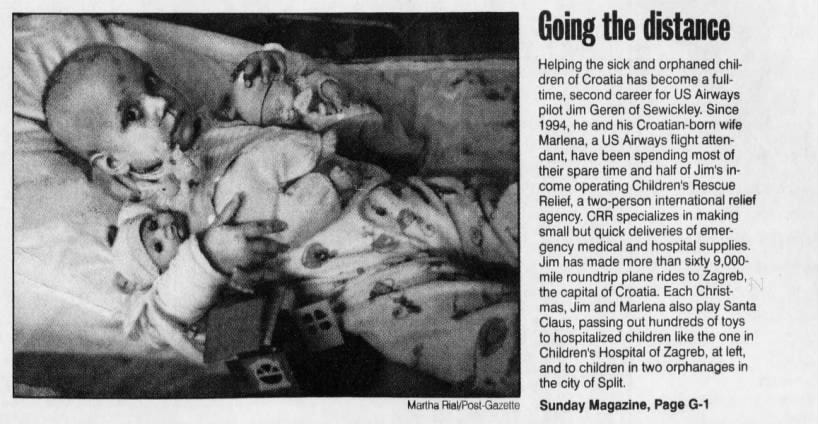



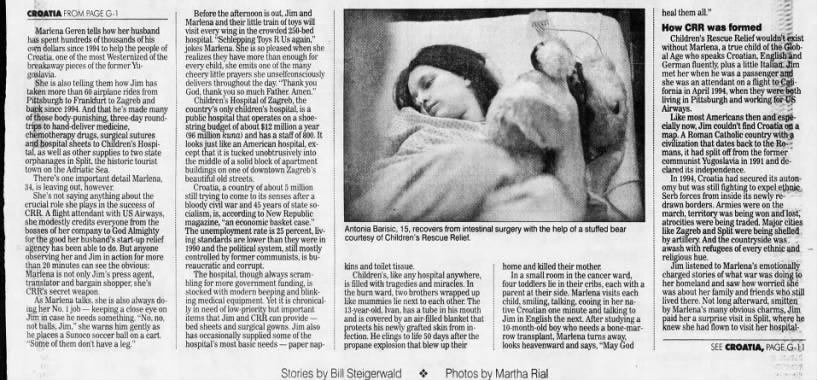
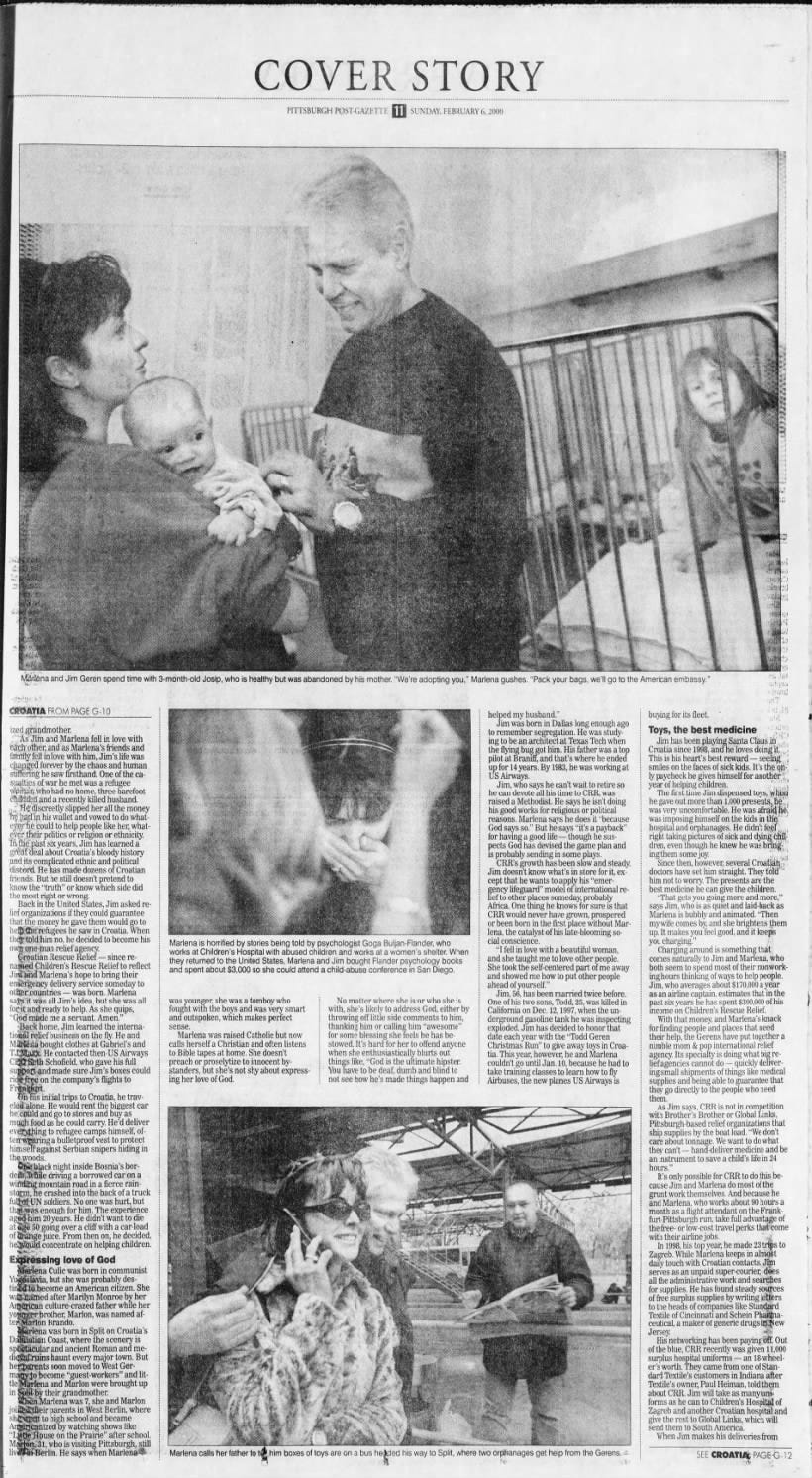

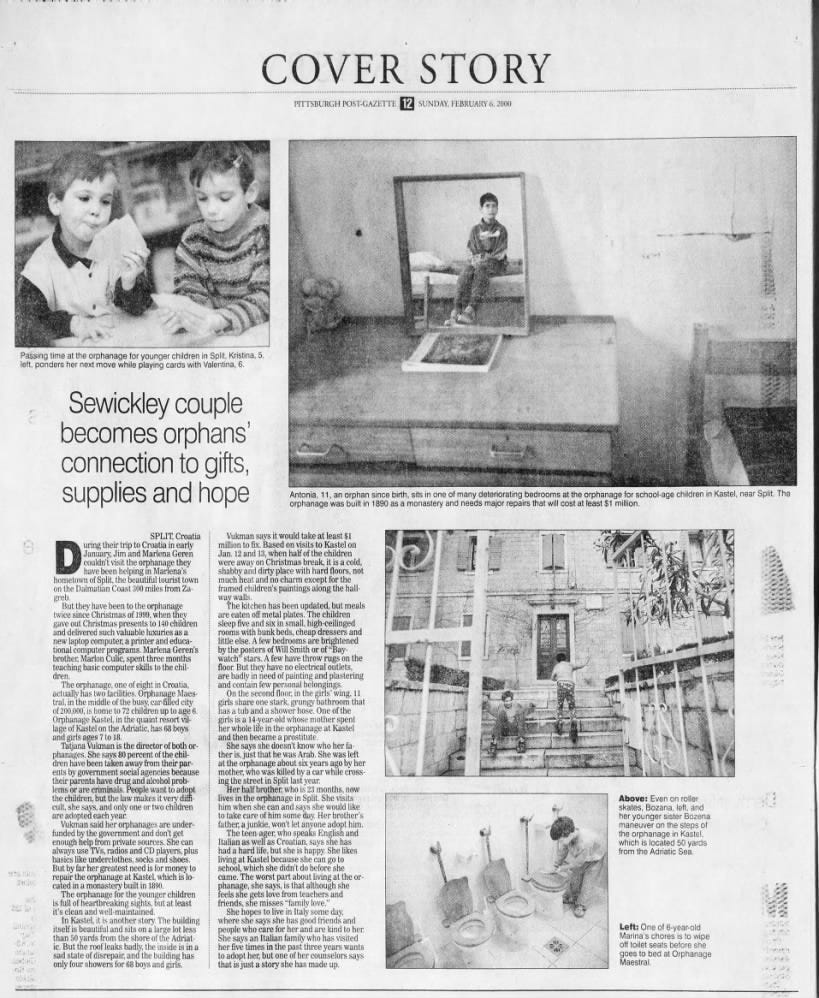
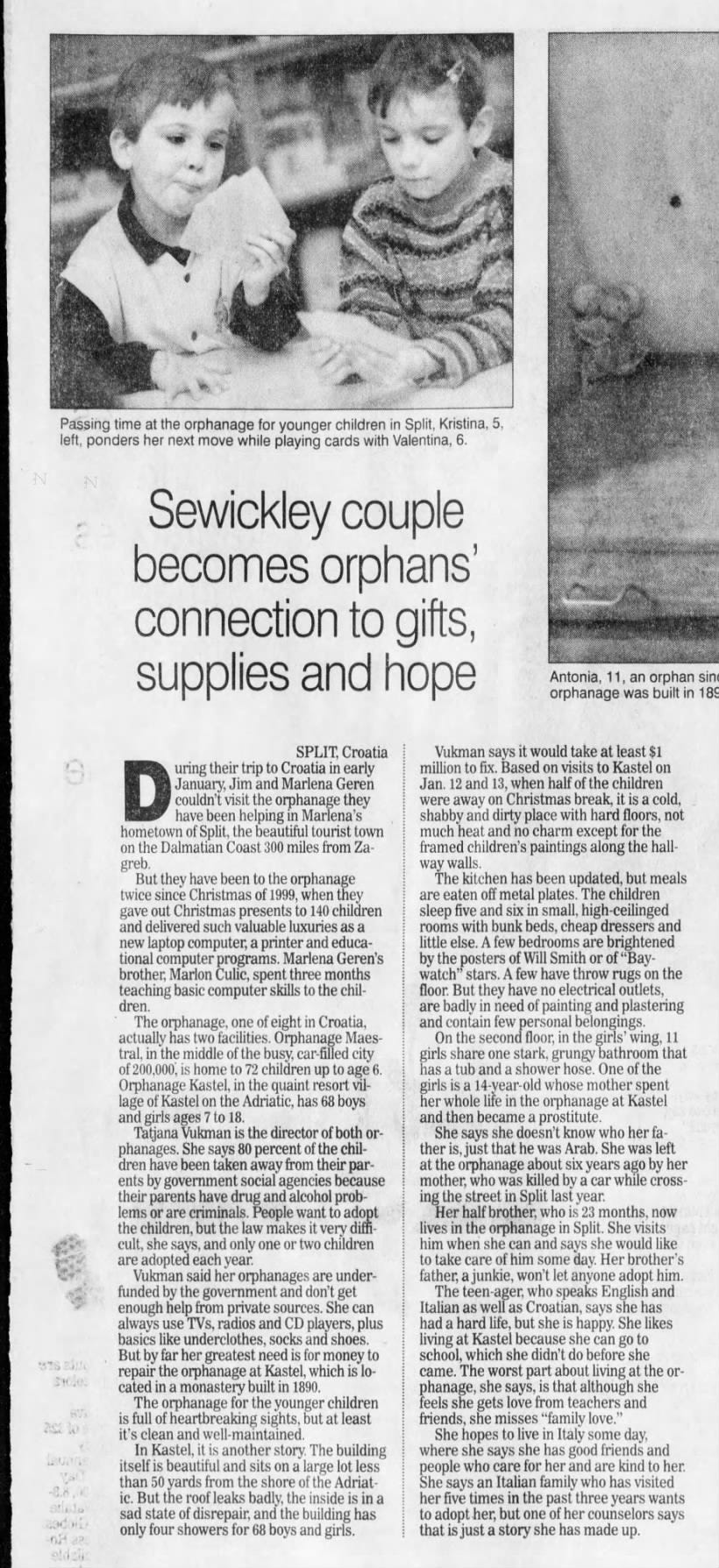
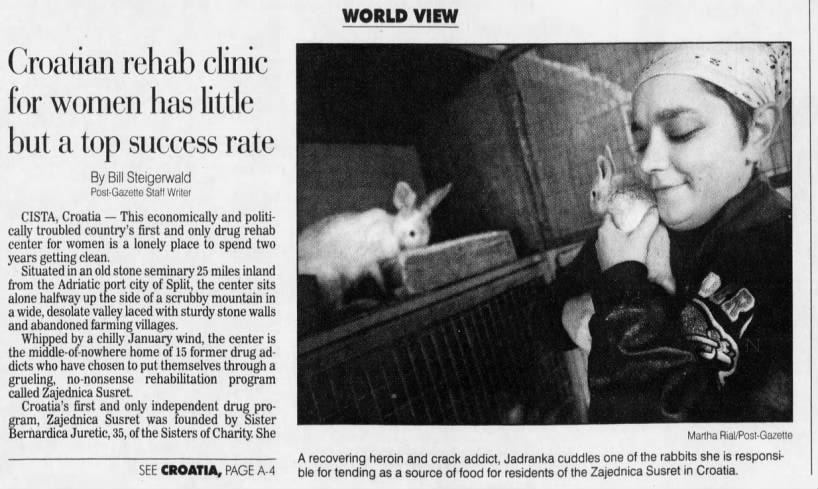
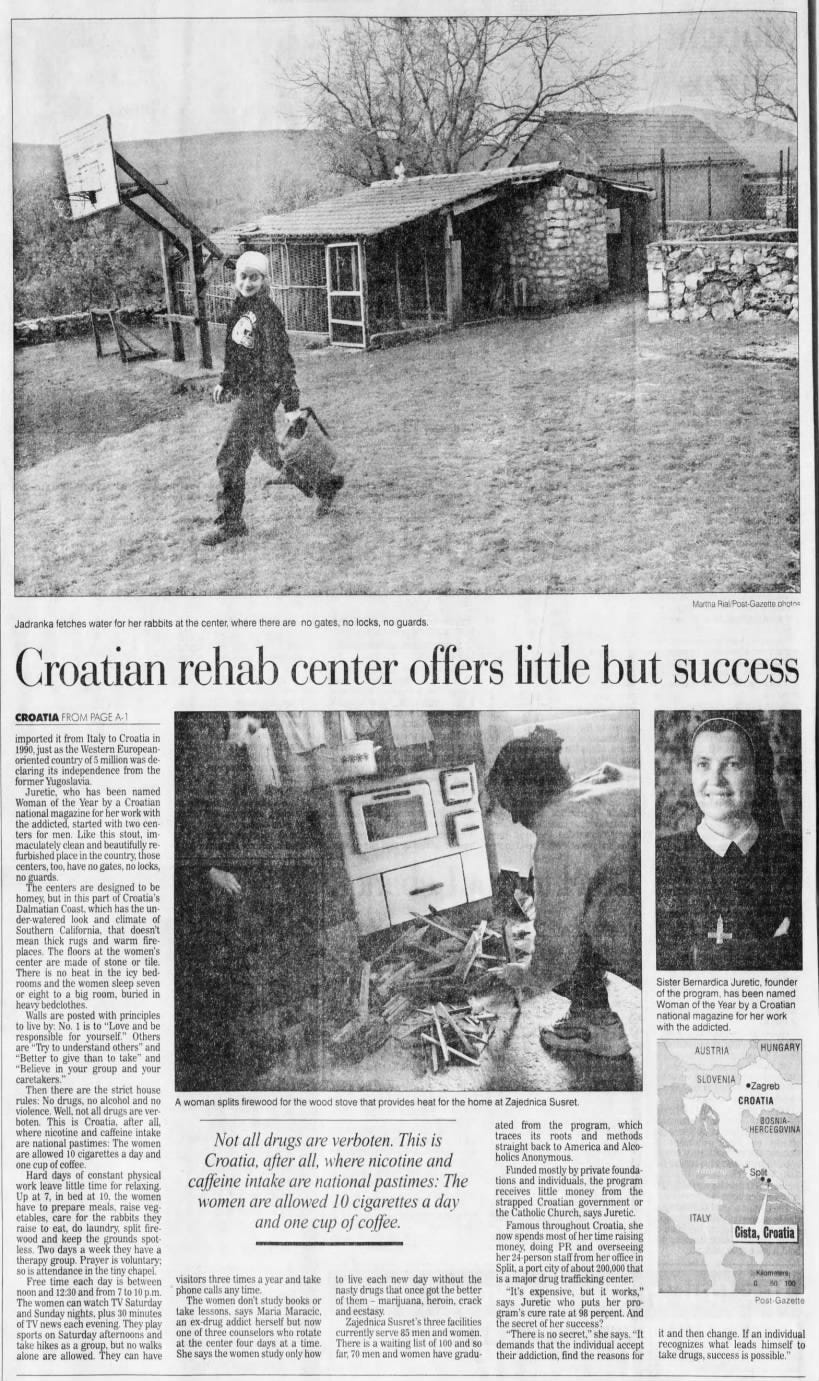
I don't know about "no paper" but our former employer sure won't produce work this like again.